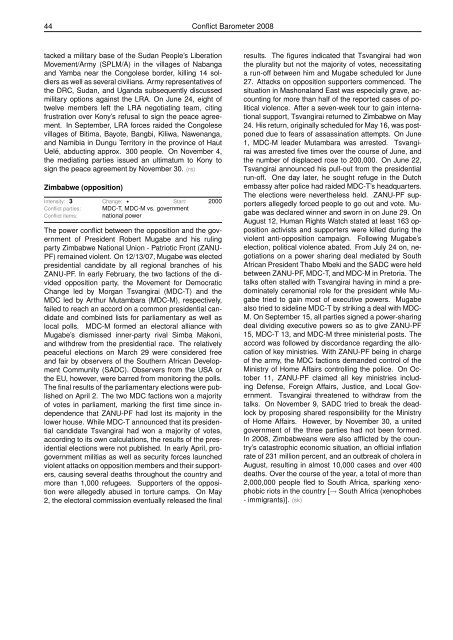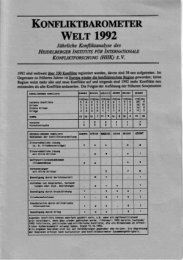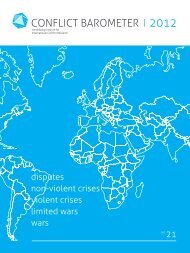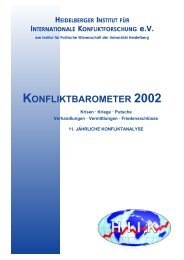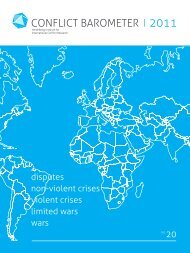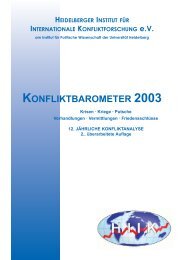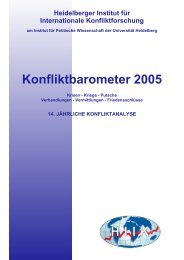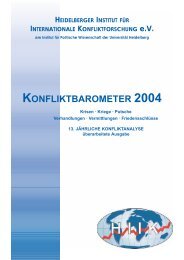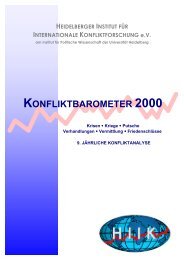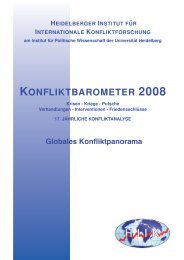CONFLICT BAROMETER 2008
CONFLICT BAROMETER 2008
CONFLICT BAROMETER 2008
You also want an ePaper? Increase the reach of your titles
YUMPU automatically turns print PDFs into web optimized ePapers that Google loves.
44 Conflict Barometer <strong>2008</strong><br />
tacked a military base of the Sudan People’s Liberation<br />
Movement/Army (SPLM/A) in the villages of Nabanga<br />
and Yamba near the Congolese border, killing 14 soldiers<br />
as well as several civilians. Army representatives of<br />
the DRC, Sudan, and Uganda subsequently discussed<br />
military options against the LRA. On June 24, eight of<br />
twelve members left the LRA negotiating team, citing<br />
frustration over Kony’s refusal to sign the peace agreement.<br />
In September, LRA forces raided the Congolese<br />
villages of Bitima, Bayote, Bangbi, Kiliwa, Nawenanga,<br />
and Namibia in Dungu Territory in the province of Haut<br />
Uelé, abducting approx. 300 people. On November 4,<br />
the mediating parties issued an ultimatum to Kony to<br />
sign the peace agreement by November 30. (rs)<br />
Zimbabwe (opposition)<br />
Intensity: 3 Change: Start: 2000<br />
Conflict parties: MDC-T, MDC-M vs. government<br />
Conflict items: national power<br />
The power conflict between the opposition and the government<br />
of President Robert Mugabe and his ruling<br />
party Zimbabwe National Union - Patriotic Front (ZANU-<br />
PF) remained violent. On 12/13/07, Mugabe was elected<br />
presidential candidate by all regional branches of his<br />
ZANU-PF. In early February, the two factions of the divided<br />
opposition party, the Movement for Democratic<br />
Change led by Morgan Tsvangirai (MDC-T) and the<br />
MDC led by Arthur Mutambara (MDC-M), respectively,<br />
failed to reach an accord on a common presidential candidate<br />
and combined lists for parliamentary as well as<br />
local polls. MDC-M formed an electoral alliance with<br />
Mugabe’s dismissed inner-party rival Simba Makoni,<br />
and withdrew from the presidential race. The relatively<br />
peaceful elections on March 29 were considered free<br />
and fair by observers of the Southern African Development<br />
Community (SADC). Observers from the USA or<br />
the EU, however, were barred from monitoring the polls.<br />
The final results of the parliamentary elections were published<br />
on April 2. The two MDC factions won a majority<br />
of votes in parliament, marking the first time since independence<br />
that ZANU-PF had lost its majority in the<br />
lower house. While MDC-T announced that its presidential<br />
candidate Tsvangirai had won a majority of votes,<br />
according to its own calculations, the results of the presidential<br />
elections were not published. In early April, progovernment<br />
militias as well as security forces launched<br />
violent attacks on opposition members and their supporters,<br />
causing several deaths throughout the country and<br />
more than 1,000 refugees. Supporters of the opposition<br />
were allegedly abused in torture camps. On May<br />
2, the electoral commission eventually released the final<br />
results. The figures indicated that Tsvangirai had won<br />
the plurality but not the majority of votes, necessitating<br />
a run-off between him and Mugabe scheduled for June<br />
27. Attacks on opposition supporters commenced. The<br />
situation in Mashonaland East was especially grave, accounting<br />
for more than half of the reported cases of political<br />
violence. After a seven-week tour to gain international<br />
support, Tsvangirai returned to Zimbabwe on May<br />
24. His return, originally scheduled for May 16, was postponed<br />
due to fears of assassination attempts. On June<br />
1, MDC-M leader Mutambara was arrested. Tsvangirai<br />
was arrested five times over the course of June, and<br />
the number of displaced rose to 200,000. On June 22,<br />
Tsvangirai announced his pull-out from the presidential<br />
run-off. One day later, he sought refuge in the Dutch<br />
embassy after police had raided MDC-T’s headquarters.<br />
The elections were nevertheless held. ZANU-PF supporters<br />
allegedly forced people to go out and vote. Mugabe<br />
was declared winner and sworn in on June 29. On<br />
August 12, Human Rights Watch stated at least 163 opposition<br />
activists and supporters were killed during the<br />
violent anti-opposition campaign. Following Mugabe’s<br />
election, political violence abated. From July 24 on, negotiations<br />
on a power sharing deal mediated by South<br />
African President Thabo Mbeki and the SADC were held<br />
between ZANU-PF, MDC-T, and MDC-M in Pretoria. The<br />
talks often stalled with Tsvangirai having in mind a predominately<br />
ceremonial role for the president while Mugabe<br />
tried to gain most of executive powers. Mugabe<br />
also tried to sideline MDC-T by striking a deal with MDC-<br />
M. On September 15, all parties signed a power-sharing<br />
deal dividing executive powers so as to give ZANU-PF<br />
15, MDC-T 13, and MDC-M three ministerial posts. The<br />
accord was followed by discordance regarding the allocation<br />
of key ministries. With ZANU-PF being in charge<br />
of the army, the MDC factions demanded control of the<br />
Ministry of Home Affairs controlling the police. On October<br />
11, ZANU-PF claimed all key ministries including<br />
Defense, Foreign Affairs, Justice, and Local Government.<br />
Tsvangirai threatened to withdraw from the<br />
talks. On November 9, SADC tried to break the deadlock<br />
by proposing shared responsibility for the Ministry<br />
of Home Affairs. However, by November 30, a united<br />
government of the three parties had not been formed.<br />
In <strong>2008</strong>, Zimbabweans were also afflicted by the country’s<br />
catastrophic economic situation, an official inflation<br />
rate of 231 million percent, and an outbreak of cholera in<br />
August, resulting in almost 10,000 cases and over 400<br />
deaths. Over the course of the year, a total of more than<br />
2,000,000 people fled to South Africa, sparking xenophobic<br />
riots in the country [→ South Africa (xenophobes<br />
- immigrants)]. (sk)


